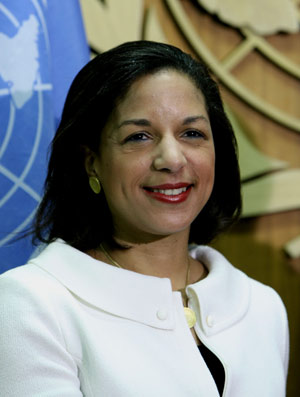Iran's government spokesman said Tuesday that Iran is waiting for the "practical changes" in the U.S. policy, one day after Washington said it looked forward to direct diplomacy with Tehran, Iran's ISNA news agency reported.
|

|
|
Photo taken on Jan. 26, 2009 shows Susan Rice, new U.S. Permanent Representative to the United Nations, at the UN headquarters in New York, the United States. [xinhua] |
"We are waiting for the practical changes from the new U.S. administration," Gholam-Hossein Elham was quoted as saying.
"The United States has to accept that it is a government within its own limits, not an empire... and we are waiting to see if such changes will come true," Elham said in the sidelines of a conference on Holocaust held in Tehran's Industrial University of Sharif.
Susan Rice, the new U.S. permanent representative to the United Nations, said on Monday that "We look forward to engaging in vigorous diplomacy that includes direct diplomacy with Iran."
However, she said the refusal by Iran to meet international obligations would cause pressure to increase.
"We will look at what is necessary and appropriate with respect to maintaining pressure toward that goal of ending Iran's nuclear program," she added.
"Dialogue and diplomacy must go hand in hand with a very firm message from the United States and the international community that Iran needs to meet its obligations as defined by the Security Council and its continued refusal to do so will only cause pressure to increase."
On Monday, an Iranian lawmaker labelled U.S. President Barack Obama a "soft face of U.S. imperialism."
"Barack Obama is the soft face of the United States' imperialistic policies... and it is still soon to make a judgment over the performance of the new U.S. president," Seyed Mohammad Reza Mir-Tajoddini said.
On Sunday, Iran's Majlis (parliament) Speaker Ali Larijani criticized new U.S. President Barak Obama's theory of change, saying it is "doubtful," but added that the next G5+1 meeting would be a test for a "change" in the policy.
The way how Washington deal with Iran's nuclear issue at the next meeting of UN Security Council permanent members, including France, Britain, China, Russia and the United States, plus Germany(Group 5+1) would be a showcase of Obama's policy towards Tehran, Larijani was quoted as saying by Iran's official IRNA news agency.
Iran's controversial and highly sensitive nuclear issue has come in the spotlight for more than five years.
The United States and its allies accuse Iran of trying to develop nuclear weapons under the cover of a civilian nuclear program. Iran has denied the charges and insisted that its nuclear program is for peaceful purposes only.
Although propaganda of potential military confrontations over Iran's nuclear issue has never stopped, the United States and its allies were still trying to block Iran's nuclear process by both negotiations and sanctions.
Analysts believe that both sides need to make change in their stance on the issue.
Obama's victory in U.S. presidential elections is considered by the international community as a "chance" to bring change in solving the Iranian nuclear issue.
(Xinhua News Agency January 28, 2009)